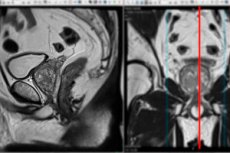Nye publikasjoner
Kunstig intelligens er bedre til å oppdage prostatakreft på MR enn radiologer er
Sist anmeldt: 02.07.2025

Alt iLive-innhold blir gjennomgått med medisin eller faktisk kontrollert for å sikre så mye faktuell nøyaktighet som mulig.
Vi har strenge retningslinjer for innkjøp og kun kobling til anerkjente medieområder, akademiske forskningsinstitusjoner og, når det er mulig, medisinsk peer-evaluerte studier. Merk at tallene i parenteser ([1], [2], etc.) er klikkbare koblinger til disse studiene.
Hvis du føler at noe av innholdet vårt er unøyaktig, utdatert eller ellers tvilsomt, velg det og trykk Ctrl + Enter.

Kunstig intelligens (KI) oppdager prostatakreft oftere enn radiologer. I tillegg forårsaker KI halvparten så mange falske alarmer. Dette vises av en internasjonal studie koordinert av Radboud University Medical Center og publisert i The Lancet Oncology. Dette er den første storskalastudien der et internasjonalt team transparent evaluerer og sammenligner KI med radiologers vurderinger og kliniske resultater.
Radiologer står overfor økende arbeidsmengde ettersom menn med økt risiko for prostatakreft nå rutinemessig gjennomgår MR-skanning av prostata. Diagnostisering av prostatakreft ved hjelp av MR krever betydelig ekspertise, og det er mangel på erfarne radiologer. Kunstig intelligens kan bidra til å løse disse problemene.
Kunstig intelligens-ekspert Henkjan Hausman og radiolog Maarten de Rooy, ledere av PI-CAI-prosjektet, organiserte en stor konkurranse mellom AI-team og radiologer med et internasjonalt team. Sammen med andre sentre i Nederland og Norge utførte de mer enn 10 000 MR-skanninger. De identifiserte transparent tilstedeværelsen av prostatakreft hos hver pasient. Ulike grupper rundt om i verden fikk utvikle AI for å analysere disse bildene.
De fem beste bidragene ble kombinert til en superalgoritme for å analysere MR-skanninger for prostatakreft. Til slutt ble AI-poengsummene sammenlignet med poengsummene til en gruppe radiologer på fire hundre MR-skanninger av prostata.
Nøyaktig diagnostikk PI-CAI-fellesskapet samlet mer enn to hundre AI-team og 62 radiologer fra tjue land. De sammenlignet resultatene fra AI-en og radiologene ikke bare med hverandre, men også med gullstandarden, og sporet resultatene til menn som hadde fått skannet. I gjennomsnitt ble mennene fulgt i fem år.
Denne første internasjonale studien om bruk av kunstig intelligens i diagnostisering av prostatakreft viser at kunstig intelligens oppdager nesten 7 % flere betydelige prostatakrefttilfeller enn en gruppe radiologer. I tillegg identifiserer kunstig intelligens mistenkelige områder som senere viser seg å være ikke-kreftfremkallende i 50 % færre tilfeller. Dette betyr at antallet biopsier kan halveres ved hjelp av kunstig intelligens.
Hvis disse resultatene bekreftes i senere studier, kan det være til stor nytte for radiologer og pasienter i fremtiden. Det kan redusere radiologenes arbeidsmengde, gi mer nøyaktige diagnoser og minimere unødvendige prostatabiopsi. Den utviklede kunstige intelligensen må fortsatt valideres og er ennå ikke tilgjengelig for pasienter i kliniske omgivelser.
Kvalitetssystem Hausman bemerker at offentligheten mistror AI. «Dette er fordi produsenter noen ganger lager AI som ikke er god nok», forklarer han. Han jobber med to ting. Det første er en offentlig og transparent test for å evaluere AI på en rettferdig måte. Det andre er et kvalitetsstyringssystem, likt det som finnes i luftfartsindustrien.
«Hvis fly nesten kolliderer, vil sikkerhetskomiteen studere hvordan man kan forbedre systemet slik at det ikke skjer i fremtiden. Jeg ønsker det samme for AI. Jeg ønsker å studere og utvikle et system som lærer av hver feil, slik at AI-en overvåkes og kan fortsette å forbedres. På den måten kan vi bygge tillit til AI i helsevesenet. Optimal, overvåket AI kan bidra til å gjøre helsevesenet bedre og mer effektivt.»
